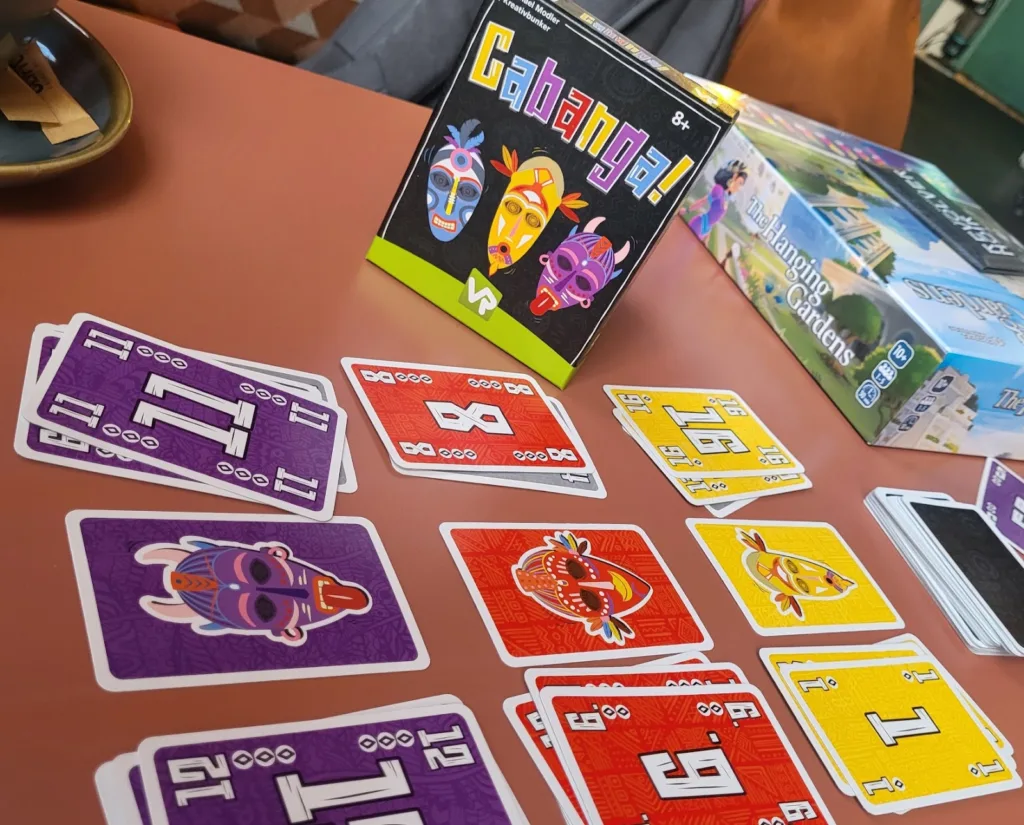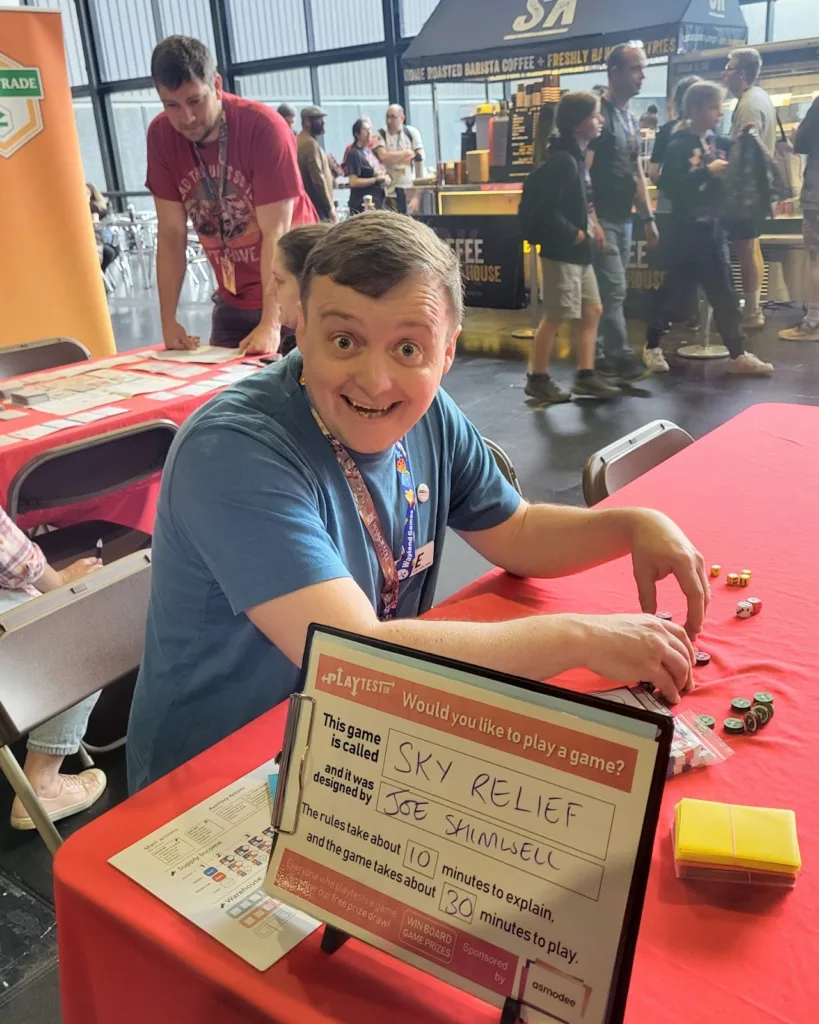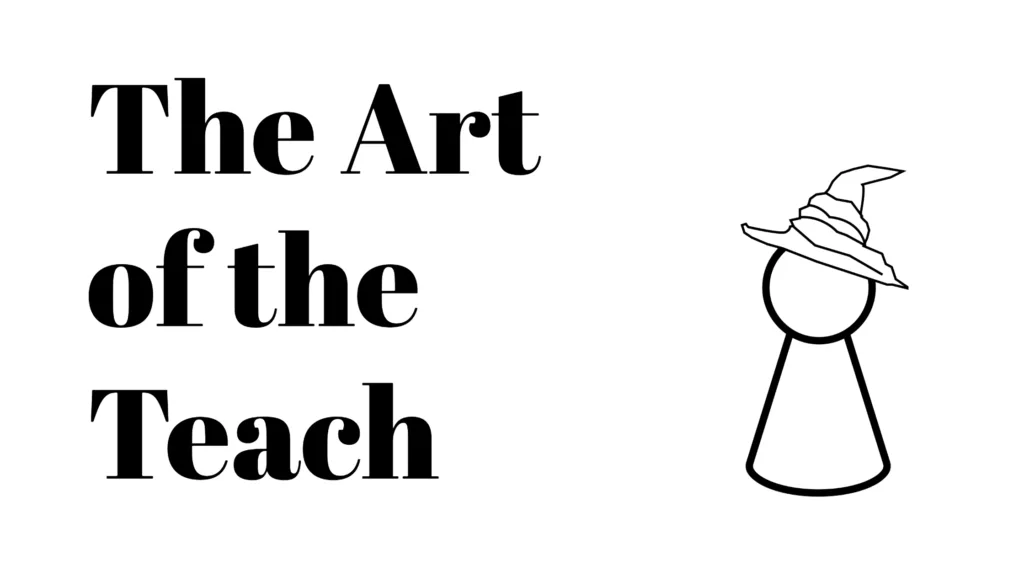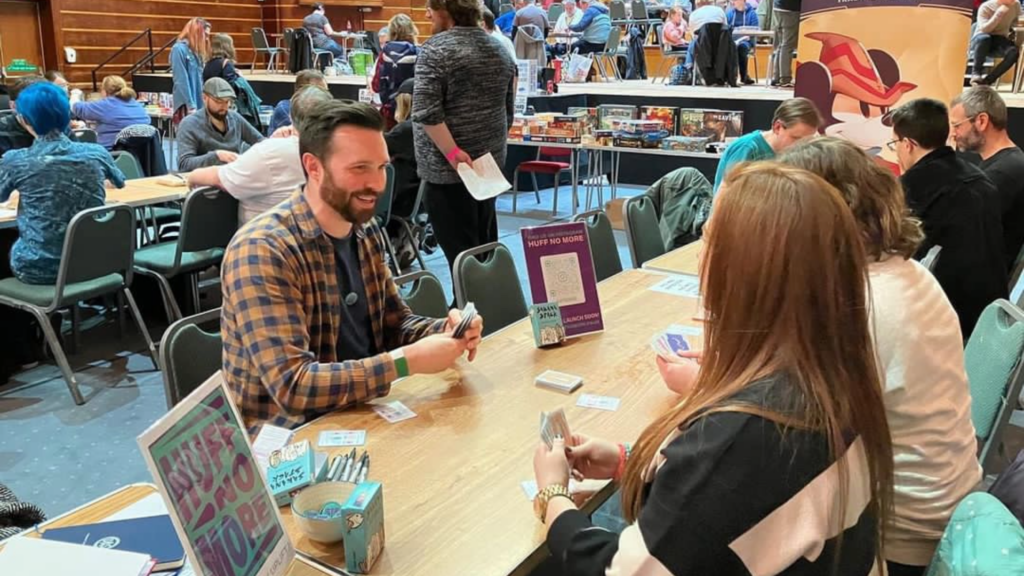Teaching a board game well can transform an evening. It’s the difference between players diving into an engaging experience and struggling through confusion, frustration, or worse, boredom. Yet for many of us, whether we’re introducing friends to our latest purchase or playtesting our own designs, the art of “the teach” remains something we muddle through rather than master. How do we move beyond simply reading rules aloud to creating that moment when everything clicks for our players?
I’m delighted to welcome back Will, The Board Game Wizard, who previously shared his insights on narrative and theme (you can catch up on that conversation in Let’s get thematic: talking theme in tabletop games with The Board Game Wizard). This time, we’re exploring his expertise in game teaching, from the fundamental principles that make explanations stick to the specific challenges facing designers during playtests.
Enjoy (and sign up for our 1-page ‘how to’ guide to teaching for designers)
Joe: Heya Will, welcome back to the blog. For those who don’t know you, can you introduce yourself? What brings you to the world of board game design?
Will: Wotcha, groovy to be back, Joe. Board game design, me? Well, I guess I dabble in various board game-related shenanigans, from working in a board game café to working for a publisher (including developing signed titles, amongst other things). I also have a game signed by a large UK publisher and a series of designs I’m working on. I’ve been published in a board game magazine… blah, blah, blah, etc., etc… Living surrounded by board games gives me a wealth of experience in the hobby and, if you’ve met me, I’ve always got something to say about most things. Being a sociable geek who put their hand to amateur dramatics and coming from a background in training, I guess one of my specialist subjects is “the teach”.
Joe: Thanks Will – previously we talked about the importance of theme in board games, but this (as you’ve subtly hinted) I’d love to talk about “the teach”.
Let’s start out small here, with a bit of definition: what is “the teach”?
Will: You know me Joe, always subtle. Master of the segue.
In short, what we’re talking about is efficiently and effectively verbally passing on the knowledge to play a tabletop game to a player or group of players.
Joe: Right, we’re all on the same page then – before we get into the how-to, let’s talk about why this matters – what’s at stake when someone gives a poor teach? How does it impact the gaming experience?
Will: Great questions Joe, you should do a blog…
The answer here does depend on the circumstances you are in, but my number one answer would be you really want the players to have the best experience possible with a game, be it a first play, a reminder, a prototype or playtest… a good teach will get those rules passed across and hopefully make for a memorable (in a good way) experience. Let’s face it, you could just read from the rulebook, but that’s likely to be a dry and lacklustre time and people are very likely to shut down and not take in what they need to. Games are primarily fun and a wall of text read out in a monotonous tone is not the best way to start that fun.
You really want the players to have the best experience possible with a game, be it a first play, a reminder, a prototype or playtest.
Joe: Thanks Will. So before we get into the designer’s perspective – what are the fundamental principles of a good teach? What should everyone keep in mind when explaining a game?
Will: Simplicity and clarity (just like in writing a rulebook) are 100% fundamental to a quality teach. To elevate to a great teach, building narrative and a little bit of (appropriate) humour are also important. But in most cases the thing that many players really want to know is how to win. A way to embed this is to start the teach with letting people know how to win so that they can consider the rules with a view to achieving victory and then end the teach the same way, as after they have heard the rules, reminding them the goal of the game will refocus them.

As an aside, I will just mention here that when teaching I am always aware that people are different and learn in different ways, watching for the signs that they are having issues with your methods and either change your approach to see what works or, even better, ask them how they think they learn best. Doing instead of listening is understandably a more popular route to learning for many people.
Be aware of your own mental state. Breathe and think before you speak and try your best not to get wound up when something doesn’t stick.
I have one other vital thing to mention here. Be aware of your own mental state. Breathe and think before you speak and try your best not to get wound up when something doesn’t stick. Harsh words will build up barriers between you and the players; be calm and considerate… empathy is something a great teacher has to have. There’s a reason that the term for a professional games teacher is a games guru.
Joe: This is gold dust. I know you’ve been teaching plenty of Galactic Cruise recently; in fact you taught it to me last summer. What does your preparation for a teach look like?
Will: Ha ha ha… that’s cute. You think I prepare for a teach! You’re a funny chap, Joe.
Seriously, on my day-to-day I have no time for preparation. The café has hundreds of games and at the drop of a hat I have to be ready to teach pretty much any of them. Yeah, people wonder how I do it; that’s a different story. All I can say is, I am a wizard, I guess.

To actually answer your question, here’s an example. I played Cabanga! yesterday for the first time and I’m now ready to teach it. I’m sure my first few teaches will be a bit ropey, but I’ll make sure to get one or two done in the café for the right audience over the next few shifts. My teach will improve, I’ll try a few amusing comments and see which work and gauge how well the game sticks with people and readjust who is the ideal audience, and it’ll probably join my roster of games that I’ll regularly teach.
Longer games take more effort. Galactic Cruise though was not a chore to learn; it may be a bit of a beast, but the narrative actually helps me remember all the rules. I guess I’m lucky enough to be a natural at these things and can translate a wall of text and a play into a teach.
Here’s the actual secret to preparing a teach. Know what you require to be able to be confident in teaching. We are all different, just as people learning a game need to be catered for, you also need to know how your mind works and prepare accordingly (Man, that seems like such a cop-out, but it’s true!).
So, centre yourself, take a deep breath and enjoy the experience. If you’ve done the groundwork then believe in yourself, that is enough to prepare.
Joe: I suppose that “know what you require” comes with practice and a lot of having a go and reflecting on what you felt worked (and didn’t).
A narrative definitely helps. I’ve seen your Galactic Cruise teach, and while there’s probably not a worn script, there’s certainly a method to how you explain the rules.
I assume “the rulebook” is your core guidance document that’s going to inform your teach, but I wonder how often you almost have to aurally rewrite the rules?
Will: 100% the rulebook is my first point of contact for guidance and as time goes by it seems that the creation of a good rulebook is getting better by established companies. Take the recently released Santorini 2nd edition: the first rulebook was dry and mostly a daunting wall of text; the new one is a single sheet with basic rules on one side and mostly a glossary and advanced rules on the other. Much better for such a game that is so simple at its core. Totally not how I teach it though… over many teaches I’ve honed it into a narrative.
What was move, build, check for win becomes a story of gods influencing mortals by first of all changing their perspective (move), giving them opportunities to improve themselves (build) and seeing if they have become worthy (check for win). From this the nuances of the rules have a narrative reason and so are much easier to remember.
Written rules lack the back and forth of an in-person teach and so will always need to be adapted for the change in delivery. It’s even trickier when you are a board game developer and your rules are changing between teaches; to start with you may not even have a rulebook!
Joe: Let’s move this on to a very specific sort of teach – the teach us designers do when we’re starting a playtest. I believe a well-executed teach for a playtest can really help your players provide you with better feedback through the game and at the end. But teaching games is daunting, right, especially when coupled with the judgement of the playtest. What would you add about the importance of a playtest teach?
Will: A playtest teach is a tricky beast, not only are you trying to get the players to grok the game but, depending on the stage of the game, you’re likely looking for feedback on aspects of the game too. As an aside, I totally recommend having pre-prepared feedback forms and before even starting the teach, let them have the form and get them to look over it or go through it with them. If you’re looking for very specific feedback, let them know ahead of time and let them write notes during their play.
A playtest teach is a tricky beast
Another aspect of their trickiness is something I touched on previously: your rules will likely be in flux between games so make sure that you’re taking notes on the current iteration so that you don’t start teaching a previous iteration. We’re only human and it’s easy to get older iterations confused with newer ones, especially if the game has been shelved for a time whilst you develop another title (this clearly applies to prolific designers, not looking at anyone here, obviously).
If part of the rules is under scrutiny by yourself, be careful not to flag this in your teach. It’s very easy to signal that you’re unhappy with a section of the rules when teaching. Through tone and body language you can easily let people know that a certain part of the game isn’t working (in your eyes) and if you allow this to happen you’ll just get your players to confirm what you already thought you knew; it’s basically a self-fulfilling prophecy situation. Let people make up their own minds and don’t accidentally guide them to be an echo chamber of your own thoughts. They need to come to their own conclusions about the game.
Joe: Great, so how can designers become better teachers of their games?
Will: How can anyone become better at anything? You have to practise. Sadly there is no quick way to become a better teacher; repetition and learning from your mistakes are truly the only way to learn, just as in learning any skill.
Not to say there aren’t shortcuts though. What was mentioned before is important: keeping an eye on your own well-being and mental state is super important, as is empathising with the players. If you’re doing multiple playtests at a convention then make sure you’re not rushing or wearing yourself out. Be patient with those you are teaching; they may not be your target audience but they may still have something important to say about your design.

Just like any skill, studying those who are proficient in it will also help you. You probably watch how-to-play videos; watch one with a critical eye on a game you know well and see how that particular content creator approaches their teach. If they do something that doesn’t sit right with you, be critical and learn from that. You will always end up with your own style as everyone is different; be flexible if you can and don’t form a script in your mind, change with the players you teach.
Joe: Excellent advice. Finally, what pitfalls should we look out for?
Will: There are many pitfalls, but as long as you are listening to your players and yourself you should hopefully avoid most of them. Teaching is a job and jobs can become repetitive, and if you become bored of teaching it will show. Remember, some of us enjoy our jobs (like me!) and as a teacher of games if you show the players that you are enjoying it, that enthusiasm will likely become infectious and they will start to enjoy themselves too.
A playtest is not with a finished product (normally) and some people can be overly harsh. If someone is telling you your graphic design sucks then take this as a compliment and learn from it. If all they can complain about is how the game looks then you must have a solid game there as they had nothing to say about the gameplay. Don’t become disheartened by players who just don’t enjoy it and try to change the game into something else; they may not be your target audience but still listen and make sure you get their feedback and thank them for their time. They are trying to help you so smile, shake their hand and consider what they had to say later on. At the time, it may seem they have passed on to you a stinky turd, but within it may be a gem of an idea that could make your game the best it has been (or it may just be a stinky turd, but you gotta check).
Will’s insights remind us that teaching games is as much about empathy and observation as it is about rules knowledge. The core principles are deceptively simple: clarity, simplicity, and starting with how to win. Yet the real skill lies in adapting these fundamentals to your audience, staying aware of your own mental state, and learning from each teaching experience.
For designers, the stakes feel higher during playtests, but the same principles apply, with the added challenge of remaining neutral about rules you’re still refining.
The path to becoming a better teacher isn’t mysterious. It requires practice, patience, and genuine enthusiasm for sharing the joy of games. Whether you’re explaining a quick card game or walking players through a complex strategy title, remember that your role is to be a bridge between the rules and the fun. As Will puts it, if you show players you’re enjoying the teaching process, that enthusiasm becomes infectious. After all, great games deserve great teaches, and every player deserves that moment when the rules click and the real game begins.
And one final thing, Will and I have wrapped up this wonderful advice into a handy 1-page PDF for games designers. Want it? Subscribe to the blog using the box below and I’ll email it to you! Anyone who already subscribes, I’ll make sure I send it out to you!




Excellent post! One of the best conversations that I’ve read on “the teach”.
It’s so interesting when it comes to teaching a game. My husband designed the game so he “knows” it better than I do, but I was a teacher for 15 years so I can explain and teach it far better. I almost always explain the game now because I know how to structure the learning process without overwhelming players. We decided I would take on the rulebook for the same reasons.